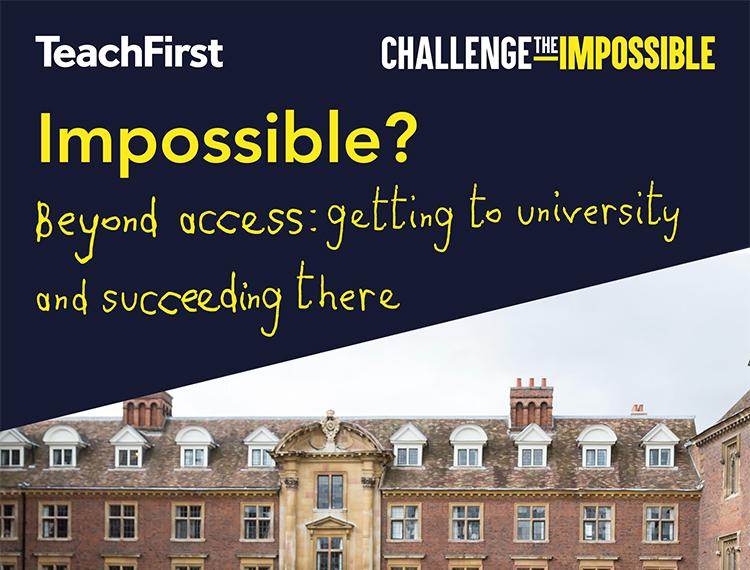Young people from disadvantaged backgrounds continue to struggle to reach their full potential – Sector Response

In the week in which thousands of students receive their A-Level results, education charity Teach First has found that those born in the poorest postcodes of the country have just a one in five chance of progressing to university. By contrast, half of young people born in the wealthiest postcodes go on to higher education.
In a report released today, in partnership with the Credit Suisse EMEA Foundation, Beyond Access: Getting to University and Succeeding There, Teach First has warned that unless action is taken by the Government, universities and wider society, young people from disadvantaged backgrounds will continue to struggle to reach their full potential.
The report argues that this is because disadvantaged young people are constantly held back by social mobility hurdles their wealthier peers do not face.
In some of the poorest areas, such as parts of Derbyshire, as few as one in twenty young people progress from school to university. In contrast, in some wealthiest parts of the country, such as parts of Buckinghamshire, over 80% of young people progress to Higher Education.
This means that those from certain affluent areas are up to 18 times more likely to get to university than those from some of the most deprived areas.
In 2015-16 universities and colleges spent three quarters of a billion (£725.2 million) on access measures, to support more disadvantaged students getting to university. But the report finds that more must be done to better target resources at ‘hard to reach’ communities and at younger pupils.
To support their investigation, Teach First carried out research with ComRes, surveying more than 2,000 18-25 year olds, and found:
- Half (47%) of the most disadvantaged young people who did not go to university said they feel like they have missed out on different opportunities by not going. Specifically, 37% they felt they missed out on career opportunities, 27% on social opportunities and 17% on both;
- Just 12% of disadvantaged young people who did not to go to university say this was because their grades weren’t good enough;
- 38% of the most disadvantaged young people who did not go to university said they would consider going in the future.
The charity has set out a series of recommendations to get more young people to university in order to reach their full potential. All the recommendations focus on better supporting young people who are from the poorest areas – or who are most likely not to progress in their education – to get to university. The charity recommends that:
- The Government forgive a proportion of students’ loans for teachers who commit to working in areas of greatest educational need. This will help raise the attainment of young people in disadvantaged communities to get the grades needed to progress to university. (see pages 6-7 of report)
- In order to help disadvantaged pupils make more informed decisions, every school should have a whole-school strategy for careers and employability with a trained careers middle leader to develop and lead on this. Resources should be targeted at rolling this out to schools in disadvantaged areas. (pages 8-9)
- The Government should create a ‘Widening Participation’ (WP) Outcomes Fund by potentially top slicing university access agreement funding, or through the allocation of additional funding to a national Widening Participation fund. This fund would focus resources on effective programmes that target specific geographic areas with low progression rates to university. The work would also be targeted from primary school to age 14. (pages 10-13)
Improving retention rates
Disadvantaged young people are nearly twice as likely to drop out of university as their wealthier peers (5% compared to 8.8%). Universities are taking the retention problem seriously and have committed to spending £134.7 million through their access agreements in 2016-17 to tackle these issues. However, the investment is not having the desired impact, with the level of disadvantaged students dropping out of university at its highest level in five years.
Currently, there is little evidence to suggest which methods are the most successful in retaining disadvantaged students, and there is limited sharing of best practise between universities.
Our poll found that:
- Over a third (40%) of disadvantaged students currently at university have considered dropping out;
- Three percent said they had already dropped out of a previous university, 11% said they had taken some action towards leaving but eventually decided not to, and 26% said they considered it, but did not end up taking any action towards it.
Looking at what disadvantaged students find the most stressful in their first year of university:
- Nearly half (47%) said keeping up with academic work;
- Around a third (31%) said balancing their academic and paid work;
- Around a third (30%) of the least advantaged said feeling like they didn’t fit in was the most stressful thing about their first year of university.
Teach First has therefore recommended that:
- A collaboration of universities trial a joint mentoring programme for disadvantaged students. They would share best practise amongst themselves, working in partnership to use evidence to tackle these increasing dropout rates. (pages 14-15)
Brett Wigdortz, CEO and Founder of Teach First said:
“When it comes to deciding what to do after leaving school, university might not be the right path for every young person. For those who chose that path, it gives them a huge range of social, cultural and economic benefits and, for the time being, it’s still the gateway for most high-status professions.
“However, today, there are still far too few disadvantaged pupils getting to university and completing their degree. They’re simply not given the same chance to reach their full potential, with less access to brilliant teaching and less guidance on how they can turn their aspirations into reality.
“More must be done by the government, universities and society as a whole to break down the barriers to social mobility that are preventing too many of our young people reaching as far as their potential allows”.
Patrick Flaherty, Chairman of the Credit Suisse EMEA Foundation and Managing Director, Global Markets, Credit Suisse said:
“At Credit Suisse, we regard education as one of the key drivers of growth and an effective means of empowering people to help themselves. Credit Suisse has a long standing relationship with Teach First, and is proud to partner with them throughout 2017. We are supporting their Challenge the Impossible campaign to help all pupils reach their full potential regardless of their background.
The Credit Suisse EMEA Foundation is investing in the expansion of Teach First’s ‘Futures’ programme of which there is a case study featured in this report. ‘Futures’ is aimed at widening access to higher education for sixth form students from disadvantaged backgrounds. Over the next two years the programme will grow by 36% to support 3,000 disadvantaged young people get into universities. Of these, 40% are likely to progress to Russell Group universities.
Teachers and schools continue to play a vital role in supporting the next generation to succeed and ‘Challenge the Impossible’. However, it’s only when businesses, the government, charities, local communities and schools come together that real change can be made – and we are honoured to be part of that change.”
Sector Response
 David Rowsell, Head of Education and Employability Programmes for Lloyds Banking Group said: “It is sadly not a surprise that students from some of the Country’s poorest postcodes are more likely to drop out of university and find it harder to access graduate-level employment due to a lack of networks and connections, compared to their peers from wealthier backgrounds. Universities cannot tackle these challenges on their own and businesses must play their part in ensuring gains made whilst at university are carried forward after graduation. That’s why we established our Lloyds Scholars programme, as a stepping stone to aid the success of talented undergraduates at university and help them progress into graduate-level employment.”
David Rowsell, Head of Education and Employability Programmes for Lloyds Banking Group said: “It is sadly not a surprise that students from some of the Country’s poorest postcodes are more likely to drop out of university and find it harder to access graduate-level employment due to a lack of networks and connections, compared to their peers from wealthier backgrounds. Universities cannot tackle these challenges on their own and businesses must play their part in ensuring gains made whilst at university are carried forward after graduation. That’s why we established our Lloyds Scholars programme, as a stepping stone to aid the success of talented undergraduates at university and help them progress into graduate-level employment.”
David Hughes, Chief Executive of the Association of Colleges, said: “Today’s report from Teach First highlights the enormous inequalities in access to higher education for young people which have not been addressed despite strenuous efforts and investment over many years. The causes and the solutions are complex and the report itself recommends some sensible approaches. For instance the report proposes that careers advice needs to be improved to help young people to choose the right path. The Association of Colleges has long been calling for this.
 Jessica Cole, Head of Policy at the Russell Group, said: “The report is right to highlight the need for good careers advice and guidance. Young people need to be aware of all the options that are available to them.
Jessica Cole, Head of Policy at the Russell Group, said: “The report is right to highlight the need for good careers advice and guidance. Young people need to be aware of all the options that are available to them.“Our universities work with schools and colleges in their local communities, raising attainment and aspirations through open events, access courses and mentoring.
“By having a diverse range of different programmes and initiatives in place, universities can identify where a particular approach is likely to be of most benefit for disadvantaged students and their local or wider communities.”
About Teach First: We believe that disadvantage should not determine destiny. Our vision is that no child’s educational success should be limited by their socio-economic background.
Our charity invests in the power of people to change the lives of children from low income backgrounds by:
- finding and developing great people to teach and lead in schools facing the greatest challenges
- increasing the attainment and aspirations of pupils and their access to higher education and employment; and
- building a movement of teachers, school leaders, social entrepreneurs, policy makers and business people who are committed to ending educational inequality.
Since 2003, Teach First has placed 10,000 leaders in schools serving low-income communities, reaching over 1 million young people.











Responses